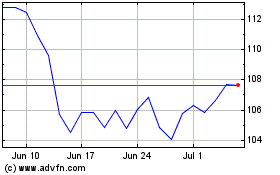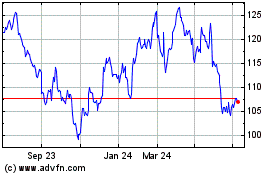By Mike Colias
Volkswagen AG has agreed to invest around $2.6 billion in Ford
Motor Co.'s autonomous-vehicle partner, Argo AI, in a deal that
values the startup at $7 billion, as the two global
auto-manufacturing giants expand an alliance struck earlier this
year.
Together the two auto makers help create a deep-pocketed new
player in the race to commercial self-driving-car services, while
at the same time expanding commitments to develop fully electric
cars. As part of the alliance, Ford said it would use a Volkswagen
tool kit to help develop and make at least one electric vehicle for
European customers starting in 2023.
"The collaboration brings some of the smartest people in the
field of autonomous driving together," said VW Chief Executive
Herbert Diess at a news conference Friday.
Jim Hackett, the Ford chief executive, said that in turn, Argo
will be able to leverage having two global auto makers as clients
which should prove crucial for hiring and retaining the best
talent.
Both companies emphasized that while they will jointly invest in
Argo and share tools, they will make distinct products for their
own respective customers.
"We remain competitors, we've been purposeful in designing
this," Mr. Hackett added.
Ford has been the majority shareholder of Pittsburgh-based Argo
since early 2017, when it agreed to invest $1 billion. VW's
investment will leave the two auto makers jointly owning a majority
stake in Argo, the companies said.
Argo will work with VW and Ford to develop autonomous-driving
technology and eventually supply each of the respective auto makers
with driverless systems once they roll out in a few years.
The $2.6 billion investment in Argo includes $1 billion in
capital funding as well as the value of VW's 200-person
autonomous-driving division in Munich, which the companies placed
at $1.6 billion. That group, called Autonomous Intelligent Driving,
is run by VW's Audi luxury-car unit and will form the foundation of
Argo's presence in Europe, the companies said.
Major auto makers have been consolidating efforts as they race
to develop driverless and electric cars and build business models
around them.
General Motors Co.'s San Francisco-based Cruise subsidiary is
developing an autonomous-driving system with Honda Motor Co., which
has agreed to invest $2.75 billion in Cruise. The startup has
attracted more than $6 billion in outside investment and was valued
at $19 billion after its latest financing round in May, GM has
said.
For Ford, bringing VW into its efforts with Argo will give the
No. 2 U.S. auto maker a foothold to develop autonomous vehicles for
the European market, said Jim Farley, Ford's president of new
businesses, technology and strategy. He said the market for
driverless-vehicle services in Europe will develop differently from
the U.S., with distinct regulations and business models.
"This is going to cost billions to develop this technology," Mr.
Farley said in an interview. "Having two incredibly strong [auto
makers] with complementary geographic footprints allows us to not
only to be smart about the deployment of capital but to attract
resources and talent."
For VW, the expanded alliance comes as the German company
aggressively ramps up its investments in electric vehicles. Last
fall the Wolfsburg-based auto maker said it would earmark roughly
$50 billion over the coming five years for electric cars,
autonomous vehicles and digital services.
On Friday, Mr. Diess said that through offering use of VW's
modular electric tool kit to Ford, the partnership hopes to
increase adoption of electric vehicles world-wide.
VW is grappling with a host of challenges. Earlier this year, VW
said it would cut 7,000 jobs in effort to trim costs as it focuses
on the electric-vehicle market. VW and some of its executives are
also facing new legal challenges from the U.S. Securities and
Exchange Commission as well as German authorities for the
continuing diesel-emissions scandal.
Ford and VW began talks last year that led to the January deal
to work together on vans and trucks for markets around the world.
The idea to work together on electric and self-driving technology
grew from those earlier talks. Both sides have said they aren't
interested in any cross-ownership deals with each other.
The race to develop self-driving cars has spawned numerous
partnerships between car companies, auto suppliers and tech
companies -- all with the goal of solving what GM Chief Executive
Mary Barra has called "one of the biggest technical challenges of
our time."
German luxury-car rivals Daimler AG and BMW AG are working
together to develop driverless cars and smartphone-based mobility
services. Alphabet Inc. 's Waymo unit, considered by many analysts
to be furthest along in technical development, is working with
several big auto makers, including Fiat Chrysler Automobiles NV,
France's Renault SA and its alliance partner, Japan's Nissan Motor
Co.
The partnerships are especially crucial for the German auto
industry, which is a pillar of the domestic economy and which has
been dogged by a steady stream of profit warnings and management
shake-ups in recent months.
Also on Friday, Daimler issued its second profit warning in
three weeks -- its fourth within a year -- citing its own ongoing
challenges from Dieselgate.
"If we still want to play a leading role going forward," said
Hubert Barth, chief executive of Ernst & Young Germany, "we
have to join forces because the competitors aren't sitting within
the country anymore."
Consulting firm AlixPartners LLP forecasts that about $45
billion will be spent on developing autonomous vehicles globally by
2025.
"This is a time, talent and capital-intensive business," Argo
Chief Executive said Bryan Salesky said in an interview. "I think
you're going to continue to see consolidation as those realizations
set in."
Ford and Argo have been testing driverless cars, with safety
drivers at the wheel, in five U.S. cities, including Miami and
Washington, D.C. The companies plan to offer an autonomous-vehicle
service sometime in late 2021, Mr. Farley said. He declined to say
whether that would involve robot taxis, commercial delivery or
other services.
Pittsburgh-based Argo has grown from about a dozen employees
since Ford's early 2017 cash infusion to about 500 people. Formed
out of the robotics program at Carnegie Mellon University, the
company will benefit from a second customer in VW and from having
its artificial-intelligence system learn from Europe's different
driving conditions, Mr. Salesky said.
Write to Mike Colias at Mike.Colias@wsj.com
(END) Dow Jones Newswires
July 12, 2019 10:31 ET (14:31 GMT)
Copyright (c) 2019 Dow Jones & Company, Inc.
Volkswagen (TG:VOW3)
Historical Stock Chart
From Mar 2024 to Apr 2024

Volkswagen (TG:VOW3)
Historical Stock Chart
From Apr 2023 to Apr 2024
